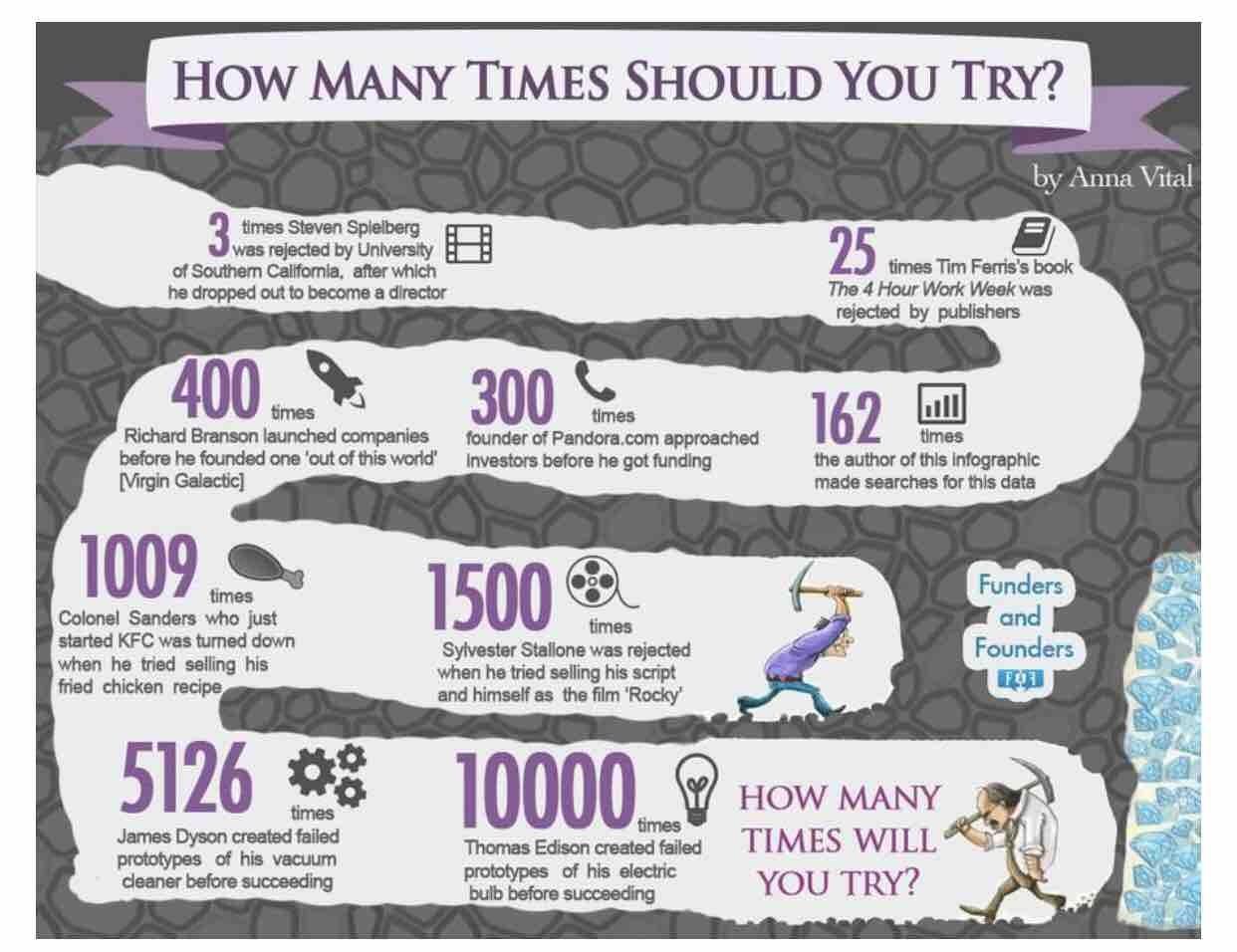Look at the above graphic. Being rejected is pretty much one of the most normal things that can happen to you in life and/or business. Unless I’m reading the graphic wrong, J.K. Rowling isn’t mentioned — and she received ‘loads of rejections’ before publishing one of the most successful book and film franchises ever. Being rejected is going to happen. There’s almost no really good idea that ever got through on the first try — which is logical, because most really good ideas inherently change a previous idea, and people are by and large not that comfortable with any form of change.
Why is being rejected important, though?
Being rejected and the work failure-success interplay
Most organizations and workplaces are terrible about discussing failure in any type of proactive way. This creates a bunch of different situations, notably the ‘Iceberg Theory’ or ‘The Duck Theory’ whereby you only see the success — the top of the iceberg or the duck gliding on the water — and you don’t see what’s underneath it all. That’s the same way failure and success work. Most people who succeed in some great way also fail about 19,238 times en route to that success — which is the whole point of the graphic above. You really can’t have success without failure, honestly.
From an evolutionary standpoint, being rejected is a total mess: human beings are social animals, and our need to ‘belong’ is in some ways stronger than our need for food and water. And because workplaces often don’t contextualize or discuss failure, it can seem to people that everything is a success, or that success is the only thing that will be tolerated, or base concepts along those lines. You factor in a quarterly earnings system — which essentially demands immediate cycles of success — and the entire idea of what work could and should be is thrown totally out of whack. There’s no room for context and legitimate examinations of failure, success, and how the two relate — there’s just room for deliverables, targets, and moving onto the next thing. That’s a huge ‘Temple of Busy’ problem that we’ve created in the last decade or two.
So why is being rejected important?
This article on the pain of social rejection has some solid ideas, which I’d summarize as:
- It can lead you to tweak certain behaviors or ideas (like a pitch deck or how you approached people)
- It can lead you to work and try harder; essentially, rejection is a motivating factor
- The pain of rejection itself is a good reminder of the value of social interaction
- You get more experience around approaching people, working with people, and understanding who wants/needs what types of concepts
I was having this conversation with my friend last night on Facebook that factors in here. His son was on a hoops team, and they had a great season — but ended with a crushing defeat. Obviously the kid (a teenager) was down, but my point was that failure and being rejected — i.e. losing a big basketball game — is crucial in shaping what happens when you encounter another big situation, or get back to a similar game. You know what you did wrong the last time, and you’re eager to fix it. And if it doesn’t work again, well, it’s time for a third shot.
[Tweet “Rejection can be the thing that drives eventual success.”]
Phrased another way: the Carolina Panthers probably will win a Super Bowl in the next five years — and when they do, getting their asses handed to them by the Broncos will have been a key factor. ‘Losing a game’ and ‘being rejected’ are different concepts, yes, but the core of both is the same.
How can you maximize the idea of being rejected?
No one wants to be rejected, but … if you want to use it as a way to move forward as opposed to just heaping tons of frustration on yourself, there are some approaches:
- Focus on building your confidence
- Understand that there’s ‘legitimate rejection’ — rooted in something logical or explainable — and completely illegitimate rejection, which is usually what you see at work. Illegitimate rejection typically comes from the idea that most people’s brains are set up to predict threats, and oftentimes people will view new, potentially good ideas as threats; as a result, they reject them simply because they don’t want their position threatened. If those are the ways you’re commonly being rejected, push through — there is someone in your organization who won’t do that, but you need to locate ’em.
- Listen to what others say as you’re being rejected; you might gain some knowledge or ideas about things you can change
In all honesty, most really big changes in a person’s life don’t come from some dramatic moment like we see in the movies — they usually come from one or two small changes being made and floating upwards to other behaviors and habits. If you’re being rejected consistently for funding or a new gig or by women or something else, there’s probably 1-2 small changes you can make around your habits and presentation that will change everything.
And remember, of course: the end of being rejected comes from one person, whether that’s a decision-maker, an investor, a romantic partner, or whatever. There are 8 billion people on the planet. You need one to believe in what you’re saying or throwing out there and then you’re done — at least in the short-term — being rejected.
The numbers are actually in your favor, even though it often doesn’t feel that way.
